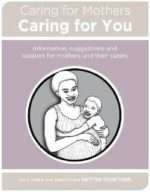Maternal Mental Health
Why do women suffer from depression and anxiety around pregnancy and birth?
When a woman is pregnant or has just had a baby, she may feel very stressed and can be easily upset. There are many reasons why she may become ill with depression and anxiety.
About one out of every three pregnant women or new mothers feels like this.
How do you know if you need help?
If you say “YES” to most of the statements below, and have been feeling like this for more than 2 weeks, please speak to your health care worker as soon as possible.
• I have been worried, and don’t know why.
• I have felt scared and panicky.
• I have had difficulty coping with things.
• I have blamed myself when things go wrong, even when it is not my fault.
• I cry a lot for no good reason.
• I have not been able to enjoy things or find things funny.
• I feel tired all the time and sleep too much or too little.
• I am scared to be alone with my baby.
• I have thought of harming my baby or myself.
• It is very difficult for me to function at home or at work.
If you feel like this, it is NOT your fault.
Some reasons women may feel distressed during pregnancy
• Not enough care or support from others, especially a partner. An unplanned pregnancy.
• Experience of violence or abuse now or in the past.
• Alcohol or drug abuse in the home.
• Worry about money or housing.
• Difficult things have happened recently like losing someone close, a job, or a home.
• Mental health problems before pregnancy.
• Previous miscarriage, abortion, stillbirth or death of a child.
• Having a frightening or unhappy birth experience before.
• A bad relationship with her mother.
• Having health problems like HIV/AIDS.
• Being too young, (e.g. teenagers).
Why should we care about maternal mental health?
Mental illness can sometimes:
• affect the development of the foetus in the womb.
• affect the baby’s growth.
• affect the child’s development (physical, emotional, intellectual).
• lead to physical illness or make physical illness worse.
• lead to defaulting on medical treatments.
• impact on functioning at work, in relationships, as parents.
Women at risk for severe stress around pregnancy may need extra support.
What can you do?
Some of these ideas may help to manage your difficulties:
• Try to get friends and family to help you. They may be able to look after children or help with housework.
• Try to be around positive people. They can help to make you feel more positive.
• Try to eat balanced meals and get regular rest and exercise.
• Think about a time when you managed a difficult problem well. What helped you then? How did you make a plan then?
• Take some time to think about possible options to help things get better. Are any worth trying? Which can you try first? What would be positive or negative about each option?
• Listen to your breathing when you are feeling stressed. Now breathe slower and deeper.
Women suffering from mental distress can get better.
What help is available?
There are different types of mental health resources available, such as counselling by a psychologist, mental health nurse, social worker or counsellor at a community organisation.
• What is in your area?
• What would suit you?
What is counselling?
Trained counsellors provide emotional support. They:
• provide a safe space to listen to your problems and feelings
• should respect your privacy and not judge you
• may work with you to help you solutions to your worries
Talking to someone can help.


